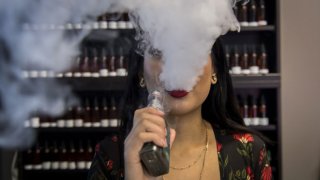
California is on track to ban the sale of most flavored tobacco products, joining states like New York and Massachusetts in an effort to slow the spread of the harmful habit among children.
The state Assembly passed the ban on Monday, two months after the state Senate passed a similar proposal. The ban faces one more vote in the Senate before heading to Gov. Gavin Newsom's desk.
The bill does not make it a crime for people to possess flavored tobacco products, but it bans retailers from selling them. Violators would face a $250 fine.
Tobacco companies have staked their future on electronic cigarettes in recent years, with Altria — one of the world's largest tobacco producers — purchasing a 35% stake in San Francisco-based e-cigarette maker Juul in 2018.
Vaping products drew scrutiny from federal regulators concerned about their attractiveness to children. In response, tobacco companies pushed for states to raise the smoking age to 21 — something Congress did last year.
But advocates say the products are still too easy for teens to get, especially with enticing flavors such as “mango” and “tropical fusion." The U.S. Centers for Disease Control and Prevention says if smoking continues among children at the current rate, it projects 5.6 million people younger than 18 will die from a smoking-related illness.
“Big tobacco has found an even more insidious way to hook our kids,” Assembly Speaker Anthony Rendon said.
Local
Get Los Angeles's latest local news on crime, entertainment, weather, schools, COVID, cost of living and more. Here's your go-to source for today's LA news.
The bill, authored by Democratic state Sen. Jerry Hill, does not ban all flavored tobacco products, with exemptions for loose leaf tobacco and “premium cigars,” defined as any cigar that is not mass produced by a machine, has a wrapper made entirely from whole tobacco leaf and cost at least $12. It also exempts shisha tobacco products, which are smoked in a hookah, a type of water pipe.
And it does not ban the sale of flavored marijuana products, which have been legal in the state for recreational use since 2018. Assemblyman Heath Flora, a Republican from Ripon, said the exemptions are “completely hypocritical.” He noted he has a photo on his phone of some brightly-colored candy infused with THC that is for sale in California.
“Let's not hide behind the kids,” Flora said. “If we actually cared about the kids we would deal with some of the other industries as well.”
Retailers note it's already illegal to sell any tobacco products to people younger than 21, saying convenience stores have a “95% success rate in keeping the product out of the hands of minors,” said James Allison, spokesperson for the California Fuels and Convenience Alliance. He said it is not fair for retailers to “bear the brunt of what is a larger societal issue," noting retailers in cities where local flavored tobacco bans have already been implemented have seen losses of as much as 40%.
“Small businesses, hundreds if not thousands of them, will immediately feel the impact of this bill,” he said.
State officials will feel the impact, too, as the ban will cut off a source of revenue for the state. In 2016, voters approved a tax increase of $2 per pack of cigarettes, which also applied to e-cigarettes. A similar version of the bill that passed Monday would cost the sate up to $218 million per year in lost tax revenue, according to an analysis by the Department of Tax and Fee Administration.
Assemblyman Jim Wood, a Democrat from Santa Rosa, scoffed at that notion, pointing out the state spends more than $3 billion a year treating smoking-related illnesses.
“I would actually consider the revenue loss as an investment in prevention for the future of the health of Californians — something we actually need to do more of in this state," Wood said.



